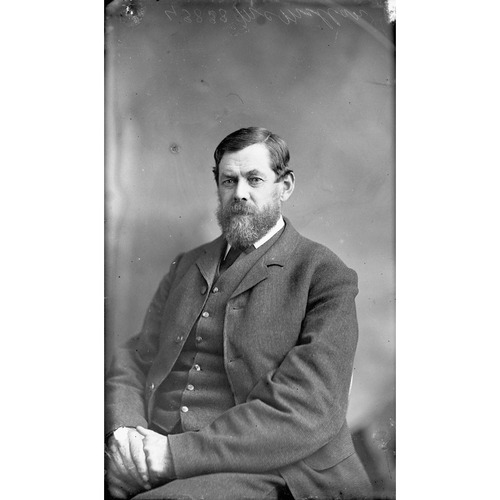McMILLAN, JOHN, farmer, office holder, and politician; b. 24 July 1824 in Kirkconnel, Scotland, son of Walter McMillan and Mary Laidlaw; m. first 20 July 1849 Janet McMichael (d. 1867), and they had four sons and four daughters; m. secondly 3 Nov. 1868 Ann Lang, widow of John Jamieson; they had no children; d. 31 Oct. 1901 in Hullett Township, Ont.
John McMillan attended parish school in Scotland. To raise money to emigrate, he reputedly worked for 18 months in an ironworks in Lanarkshire. In 1843, with his brother, Robert, he immigrated to Huron County, Upper Canada, where many of their friends and family had settled. The following year he acquired lot 2, concession 5 in Hullett from the Canada Company. By 1855 McMillan had managed to pay for this 100-acre property and by 1871 he had doubled his acreage. He worked hard clearing the land and over time built up one of the most prosperous farms in the area, eventually specializing in the export of beef cattle. His company, McMillan and Sons, also imported and sold Clydesdale horses and he frequently travelled to Britain to acquire breeding stock.
McMillan’s expertise was recognized in 1880 when, along with such other prominent agriculturists as Thomas Ballantyne, John Dryden, and William Saunders*, he was appointed by the government of Oliver Mowat to serve on the Ontario agricultural commission. At this time agriculture was trying to recover from a depression and there was a general feeling that Ontario was “indifferently farmed and even gradually exhausted.” The commission was entrusted with making recommendations on how to improve agriculture and with collecting reliable statistics. It was believed that its report would serve both as a means of attracting immigrants and as a valuable reference source for Ontario’s farmers. The commission was divided into committees, which travelled across the province holding meetings and gathering evidence. McMillan served on three of them: one on special crops such as flax, another on stock raising and dairying, and a third which was responsible for regional reports. Because of time constraints, the commission was unable to achieve all of its objectives, particularly in terms of recommendations, but its final, five-volume report emerged as a comprehensive portrait of Ontario agriculture and would, indeed, serve as a reference tool for farmers and potential immigrants.
In 1885 McMillan was named to the advisory board of the Ontario Agricultural College and two years later he was appointed to serve as a lecturer to the Farmers’ Institutes, an educational program started by the college. McMillan was a key figure in ensuring the success of the institutes and was active for many years lecturing on such diverse topics as corn, manure, draft horses, and how to keep the boys on the farm. He frequently contributed to farm journals such as the Farmer’s Advocate and Home Magazine and was a member of the Dairymen’s Association of Western Ontario.
McMillan began his political career as an assessor for Hullett Township and later served as its reeve (1877–82, 1884–87). In 1882, running as a Liberal, he was elected mp for Huron South. The following year he resigned to allow Sir Richard John Cartwright* to assume a seat in the House of Commons after his defeat in Wellington Centre. McMillan was returned again for Huron South in 1887 and he held the constituency until he was defeated in the election of 1900. In the house he was “considered the greatest authority on agricultural matters on the Liberal side,” and he served as chairman of the commons agricultural committee for several years. According to the Farmer’s Advocate, “In order to keep himself posted for his duties as a representative of the people, he travelled frequently among farmers, going through Manitoba and the Northwest carefully with that object in view.”
John McMillan died at his farm near Constance (Kinburn), Ont., in 1901 and was survived by his second wife and by two sons and a daughter.
Huron County Land Registry Office (Goderich, Ont.), Abstract index to deeds, Hullett Township. Huron County Pioneer Museum Arch. (Goderich), Catherine Plumtree coll., McMillan family hist. NA, RG 31, C1, 1851, 1861, 1871, 1881, 1891, Hullett Township. Univ. of Western Ont. Library, Regional Coll. (London), W. E. Elliott coll. Clinton New Era (Clinton, Ont.), 1880, November 1901. Farmer’s Advocate and Home Magazine, 15 Nov. 1901. Huron Expositor (Seaforth, Ont.), 31 Oct. 1896. Huron Signal (Goderich), 2 June 1882; 23 June, 30 Nov. 1883; and its successor, the Signal, 7 Nov. 1901. Canadian directory of parl. (Johnson). Canadian men and women of the time (Morgan; 1898). CPG, 1883, 1897. Dict. of Scottish emigrants (Whyte), nos.4071, 4503, 8521, 8668. Farming, 14, issues for October and November 1896. History of Hullett Township, 1884–1977 (n.p., n.d.). Ont., Commissioner of Agriculture and Arts, Annual report (Toronto), 1879–80. Ontario agricultural commission, Report of the commissioners (4v., Toronto, 1881). James Scott, The settlement of Huron County (Toronto, 1966).
Cite This Article
S. Lynn Campbell, “McMILLAN, JOHN, (1824-1901),” in Dictionary of Canadian Biography, vol. 13, University of Toronto/Université Laval, 2003–, accessed January 1, 2026, https://www.biographi.ca/en/bio/mcmillan_john_1824_1901_13E.html.
The citation above shows the format for footnotes and endnotes according to the Chicago manual of style (16th edition). Information to be used in other citation formats:
| Permalink: | https://www.biographi.ca/en/bio/mcmillan_john_1824_1901_13E.html |
| Author of Article: | S. Lynn Campbell |
| Title of Article: | McMILLAN, JOHN, (1824-1901) |
| Publication Name: | Dictionary of Canadian Biography, vol. 13 |
| Publisher: | University of Toronto/Université Laval |
| Year of publication: | 1994 |
| Year of revision: | 1994 |
| Access Date: | January 1, 2026 |





